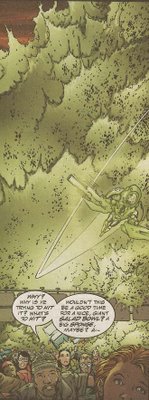Cool things:
Hawkgirl in the new JLA--well, the eleven-year-old, who adores Hawkgirl, was pretty happy about this! :)
Noted:
Green Lantern's new costume is all right (although I liked the old asymmetrical one), but the new haircut? Not so much.
I am not a big fan, generally speaking, of Life Changing Experiences in comics. Not because I object to change (well, sometimes) but because these changes rarely last even through the run of the writer who made the change, and almost never into the next writer's work.
"Awwww!" moments:
Wonder Woman helping Batman recover from his time-travel jet lag illness:

Faith telling Nightwing about what Batman said about him:

"Ew!" moments:

The idea of live birds in one's mouth literally made me queasy. Ick, ick, ick!
Things that made me laugh:
Green Lantern's dream sequence, the part before the visions. Interesting take on his fellow team members:

The "nurses" the injured Green Lantern creates for himself:

This scene with J'Onn trying to help Green Lantern figure out where his dreams are coming from. I'm not sure why GL is the source of so much humor this time around--maybe to balance out the rest of his role:

Green Arrow. The guy makes Plastic Man look like a charter member of NOW:

And speaking of Plastic Man:

Green Lantern:
One of the threads running through the story is Green Lantern's seemingly-precognitive series of dreams and visions regarding the mission, and the way he (someone not used to receiving information in this way) deals with them.
As when they're about to go into the past and he makes a half-hearted attempt to stop the trip:

And when they've made their journey, and he tries to see if anyone else shares his foreboding:

Most touching, I think, is this scene where he sees that regardless of what he does, things are going to play out in the tragic way he has foreseen:

Plastic Man:
Here's where the aforementioned Life Changing Experience thing comes in. Unlike the other JLA members, Plastic Man did not die in the past and return to life in the present. He was destroyed in the past, broken into pieces, and survived at the ocean's floor for 3000 years. (Hey, I said there were spoilers!) The JLA recovers the pieces in the present day and help him to reform himself. Plastic Man, therefore, has had 3000 years alone in his own "head":


On the one hand, you'd expect that over 3000 years one wouldn't be anything like the same person--on the other, it's not as if he's had any new experiences/input, so perhaps the broader changes would be less radical. I do like his new priority, and I'm glad they're addressing this issue (although I would have hoped it'd take something less than this to get him to go see his kid). Of course I'm not particularly thrilled to see him leave the group.
The Villain:
Although the team fights a group of enemies, the real villain is Gamemnae, a mighty sorceress and queen of early Atlantis. Very powerful, very evil, she battles the group in the past and the present alike.
At the back of Book 1, there is a commentary section. and here's a bit of what artist Doug Mahnke says about creating Gamemnae:
We had a lot of difficulties with her separating the Ancient version from the Modern one. She should have been prettier as the Ancient; we kind of uglied her up too much.
Elsewhere in the commentary section:
...by forming the Ancients and killing the JLA...she slowly becomes corrupted and sells away pieces of her soul to the dark sorcery that fuels her powers.
I'm a little unclear on what he means about her needing to be "prettier as the Ancient". Here is Gamemnae, clearly drawn to be beautiful, as she first appears, in the ancient world:

And here she is in modern times, as the present-day JLA find her:

My impression on reading the book is that it seems as though her beauty or lack of it is supposed to reflect the degree of corruption (the more evil she gets, the uglier she gets). That's what the commentary implies. This doesn't work all that well, for a couple of reasons. First is that as far as I can tell, she was pretty evil to start out with--evil and beautiful. Second is that the change in appearance seems to have more to do with her taking in power than with her evil. (The beauty was a tool--once she didn't need it, once she had enough personal power that she no longer needed to get what she wanted from others via coercion or seduction, she shed it without a backward glance.) She doesn't begin to transform until she has begun to incorporate others within herself, and you see very little of that during the Ancient World parts of the story, but that's not a change in her good/evil status per se.
In any case, while Gamemnae is certainly nobody's role model, I did find that one aspect of her pretty cool. Being willing to abandon her traditional beauty when it no longer served her needs, because she herself only valued it for what it could get her (and once that was no longer necessary she quickly went with a more efficient plan)? To abandon the ability to make her gains indirectly through the good will or desire of others? To abandon what others surely saw as a primary characteristic because in truth it had little to do with her essential (evil, ruthless, self-centered, single-minded, power-hungry) self? That makes quite a statement. It is, I think, intended to indicate that she is divorcing herself from humanity/Atlantis at that point--but that happened long before this.










































